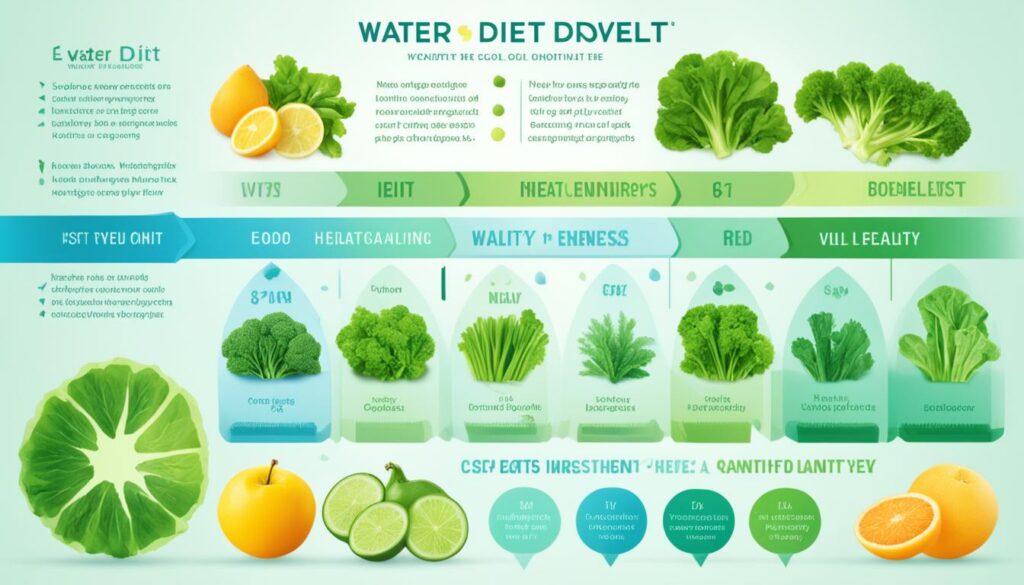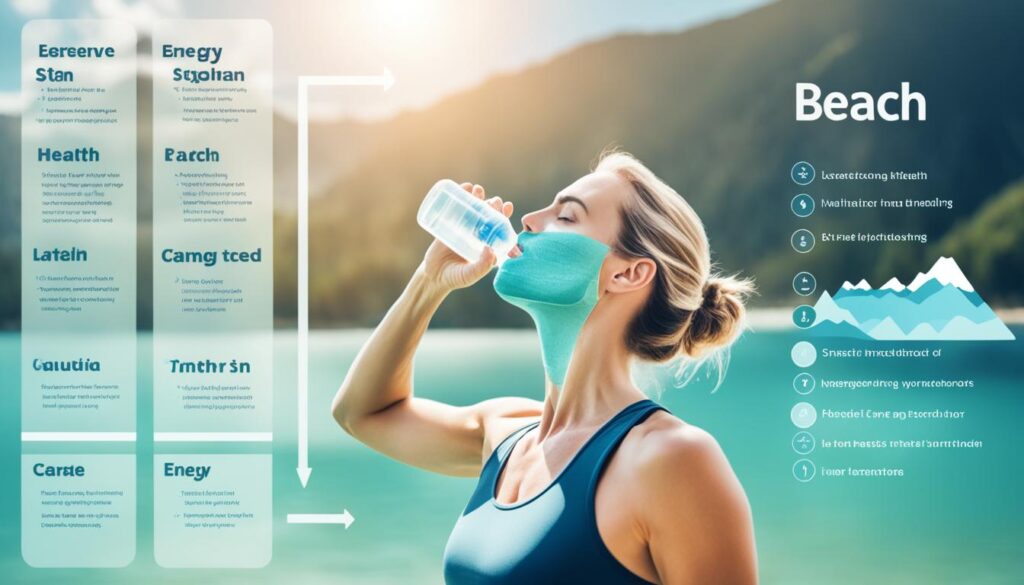Water diets are now popular among those into wellness. People follow these diets which include water fasting. This way of eating has been widely studied by scientists. Goldhamer, Longo, Mattson, and Wilhelmi de Toledo are some who have looked into the health benefits. They found that supervised water fasting helps with high blood pressure and boosts health.
These studies have shown positive health outcomes from water fasting. One research, for instance, looked at 1422 people who fasted for 4 to 21 days. Another study focused on how a 48-hour fast affected brain activity, mood, and more in weightlifters.
Recent research has explored fasting’s effects at the molecular level. It shows that fasting changes our metabolism in significant ways. For example, certain metabolites, like β-hydroxybutyrate, play a key role in improving health.
Overall, the studies back the potential benefits of water diets. But, they also urge people to be careful and well-informed. This helps avoid any bad effects and makes the most out of the health benefits of water.
Key Takeaways
- Studies show water diets can help treat hypertension and improve overall well-being.
- Metabolic shifts during fasting can promote health benefits like reduced insulin resistance.
- Research has demonstrated improvements in cognitive function and mood among weightlifters.
- Prolonged water fasting may aid in weight loss through ketosis and reduced blood sugar levels.
- Caution is advised to avoid potential side effects such as fatigue and nutrient imbalances.
The Science Behind Water Diets
People have practiced water diets for ages, both for spiritual reasons and health. Today, researchers look into the historical use of water diets. They study the impacts on our body and the different ways of fasting.
What is a Water Diet?
In a water diet, you only drink water. You cut out all other food and drinks for a while. This could be for a day, several days, or even weeks. The aim is to give the body a break from digesting food. This lets the body’s cells repair, which is shown in various studies like one from Bratislava Lek Listy in 2018. It looked at how a water fast and a special diet affect the kidneys, stress level, and antioxidants.
Historical Background and Origins
The history of water diets is tied to culture and religion. Back in ancient times, people from many cultures, including Muslims, did fasting with just water. This wasn’t just for health but also for spiritual reasons. Muslims still do this during Ramadan. They don’t eat or drink from sunrise to sunset. This shows how the body handles fasting. It has deep roots in our history and remains relevant today.
Popular Approaches to Water Diets
Now, lots of people use water diets in different ways. Intermittent fasting is one example. This includes fasting every other day or only eating during a short period each day. A study from Adv Ther in 2018 talked about the benefits of this fasting for healthy, non-obese adults. It’s also discussed in PLoS One from 2019. That study showed fasting for 4 to 21 days improved health for over 1400 people. These findings point to the positive effects of controlled water fasting under medical guidance.
- A 2015 study in Nutr Rev found intermittent fasting improved health markers and body composition.
- The book “Henry’s Clinical Diagnosis and Management by Laboratory Methods” looked at how our body reacts during fasting, like our kidneys.
- In 2013, the American Journal of Medical Sciences shared a report on a 40-day water fast. It gave us insights into very long water fasting.
The science proves water diets have a mix of old traditions and new health ideas. From Islamic fasting to today’s water fasting studies, these methods give us important info on how fasting affects our health.
Scientific Studies on the Health Benefits of the Water Diet
Scientists have looked into how the water diet affects health. They’ve checked the short and long-term effects. Goldhamer, Wilhelmi de Toledo, and Tripolt are key researchers in this area. They’ve studied the impact of water fasting.
Research Methods and Subjects
How studies look into the water diet differs a lot. For example, Goldhamer studied 174 people with high blood pressure. They fasted under medical supervision. This method included close monitoring and follow-up.
Wilhelmi de Toledo’s research observed over 1400 people fasting for 4 to 21 days. They looked at the benefits it brought to health and well-being.
Mojto focused on how fasting affects the kidneys. He mixed water fasting with a certain diet. This helped him understand the effect on the kidneys better. Tripolt ran a study on how intermittent fasting affects normal, healthy adults. This study looked at metabolic changes and overall health indicators.

Key Findings from Recent Studies
Studies have shown that the water diet and fasting can be good for health. Goldhamer noted a big drop in blood pressure in patients with stage III hypertension. It was 60 points on average.
Wilhelmi de Toledo saw positive results in safety, health, and well-being. Mojto’s research found that the water diet was good for the kidneys and reduced oxidative stress. Tinsley and La Bounty highlighted changes in how the body was made up and health markers through intermittent fasting.
| Research | Findings |
|---|---|
| Goldhamer et al. (2001) | Improvement in blood pressure |
| Wilhelmi de Toledo F et al. (2019) | Health improvement and well-being |
| Mojto V et al. (2018) | Enhanced kidney function |
| Tripolt NJ et al. (2018) | Improved metabolic markers |
| Tinsley GM and La Bounty PM (2015) | Changes in body composition |
Limitations and Future Research Directions
Though the studies are promising, they are not without flaws. They often include few participants and lack variety. Future research must involve larger, more varied groups to understand water diets fully.
There is a call for more long-term studies to see the lasting benefits of the diet. The TrueNorth Health Foundation is working on this. Their studies focus on obesity and high blood pressure. They look at changes in genetic markers and physical health. This will provide more insight into the benefits of the water diet.
Effects of Water Diets on Weight Loss
Water diets are becoming popular for being healthy and helping with weight loss. A typical water fast lasts 24-72 hours. It’s best to have a doctor monitor you if you go longer. Water fasts affect how your body burns calories and loses fat.
Impact on Metabolic Rate and Fat Loss
Studies show water diets can help speed up your metabolism and shed fat. For example, Dr. Alan Goldhamer found that water fasting helps people lose a lot of weight. This method triggers autophagy, a process that boosts how your cells work. It also makes your body more sensitive to hormones that manage your metabolism, like insulin and leptin. This all equals easier weight loss and fluid management, leading to healthier lives.
Case Studies and Anecdotal Evidence
People’s stories and research back up the idea that a water diet can burn fat. A study of an eight-day water fast found it helped lower weight, mostly due to up energy use. Many say they’ve lost a lot of weight and feel better through water fasts. This includes reports online and from people sharing their personal experiences.
| Study | Duration | Findings |
|---|---|---|
| Ogłodek & Pilis | 8 Days | Significant weight loss |
| Goldhamer | 5-10 Days | Improved metabolic rate, fat loss |
| Liebermeister | 24-72 Hours | Enhanced insulin and leptin sensitivity |
Caution is vital when considering water diets. They can carry risks like losing muscle or being dehydrated. A balanced view is necessary. Despite these risks, water diets offer effective weight loss and metabolic benefits. So, many find them worth considering carefully.
Health Benefits of Staying Hydrated
Drinking enough water is key for our bodies to work well. It helps with thinking clearly and how we look. To get all the hydration benefits, people should aim for at least eight 8-ounce glasses every day.

Hydration and Cognitive Function
Research shows that water is key for our brains to work right. Even being a little dehydrated can hurt how well our brain works and our mood. Drinking enough can boost focus, memory, and how sharp we are.
Role of Water in Detoxification
Water is needed by our kidneys to clean our blood. It helps remove waste as urine, and more water makes urine less thick, stopping kidney stones. Drinking more water also prevents constipation. Mineral water with magnesium and sodium can improve digestions too.
Impact on Skin and Physical Appearance
More water means better skin. It keeps our skin flexible, less wrinkled, and gives it a nice look. Science backs the idea that water makes our skin healthy. Drinking water around meals helps with diet \u2014 it can make us feel full, speed up our body’s work, and help lose weight.
| Benefit | Details |
|---|---|
| Cognitive Function | Mild dehydration (1-3% body weight loss) impairs brain function and mood. |
| Detoxification | Fluid intake dilutes minerals in urine, preventing kidney stones and helping with constipation. |
| Skin Health | Adequate water intake improves skin elasticity, moisture, and overall appearance. |
Risks and Precautions of Water Diets
A water diet has health benefits but also risks you need to manage. It’s important to know the side effects and who shouldn’t do it. If you want to try water fasting, make sure to follow safety tips.
Potential Side Effects
Water diets can cause dehydration, dizziness, and constipation. Your blood pressure may suddenly drop when you stand up, leading to dizziness. Be aware that the quick weight loss at the start is mostly water, carbs, and some muscle, not fat.
Who Should Avoid Water Diets?
Some people should not do water diets alone. This includes pregnant women, those who are nursing, and people over 75. Children and those with certain health conditions should also avoid it. Such health issues might get worse if not closely monitored by a doctor. Remember, it’s better to lose weight slowly according to the CDC.
Guidelines for Safe Water Dieting
Experts say not to fast on water more than 24–72 hours without a doctor’s advice. Drink 2-3 liters of mineral water a day to stay hydrated and watch for signs of dehydration. This kind of fasting might help lower blood pressure and body weight. But, after fasting, start eating again slowly. This prevents a dangerous condition called refeeding syndrome.
| Aspect | Details |
|---|---|
| Potential Side Effects | Dehydration, dizziness, constipation, low productivity, orthostatic hypotension |
| Who Should Avoid | Pregnant or nursing individuals, children, adults over 75, people with eating disorders or insulin-dependent diabetes |
| Safe Water Diet Practices | Limit fasting to 24–72 hours without medical supervision, consume 2-3 liters of mineralized water daily, reintroduce food gradually |
Being informed about water diet risks and following right steps is key. Doing so can help you get the good without the bad. Stay safe and healthy!
Conclusion
The journey through water diets showed us many things. For example, Goldhamer et al.’s study in 2001 found water fasting could help with high blood pressure. It led to big weight loss and better metabolism. Still, these benefits might not last long after the fasting ends.
Studies point out important things for water diets’ success and safety. A 2019 study by Wilhelmi de Toledo et al. looked at fasting’s effects on health and safety. It showed that fasting, diet, and staying hydrated connect in many ways.
Another study by Bar-David et al. in 2005 focused on dehydration’s impact on thinking. It argued that not drinking enough water can affect how well you think. These studies stress how keeping hydrated is crucial for good health.
So, the bottom line from hydration research is clear: keeping hydrated is key for good health. When looking into water diets, choosing carefully is important. Looking at the benefits and risks, with help from professionals, makes the journey safe and successful. More studies will help us grasp these diets better, leading to smarter use of water fasting and staying hydrated.




